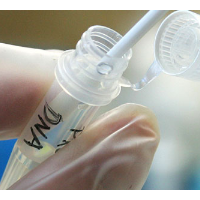DNA Privacy Bill Targets Massive State Biobank Holding 16 Million Samples

Courts across the country have been embroiled in the debate between privacy advocates and law enforcement over the gathering, storing and sharing of DNA taken from people who have been arrested but not charged with a crime.
A three-judge panel of the California First District Court of Appeal unanimously decided in December that a state policy allowing that―authorized by voter passage of Proposition 69 in 2004 and effective as of 2009―violated the California Constitution. “The California DNA Act intrudes too quickly and too deeply into the privacy interests of arrestees,” Presiding Justice J. Anthony Kline wrote.
Arrestees are, however, a minority of the population. If law enforcement is really interested in stockpiling massive amounts of DNA of innocent people, there is a warehouse in the Bay Area they might be interested in.
The state has stored, indefinitely, blood samples of every child born in California since 1982. The California Biobank Program is used by researchers to screen for more than 80 genetic and congenital disorders, like cystic fibrosis. All 50 states have programs like this, but California is just one of 20 that retain the data indefinitely. Researchers pay a fee for access to the information.
The biobank is more than a storage facility. The California Department of Public Health (CDPH) describes its networked reach thusly:
“These samples were collected for testing by the Prenatal (PNS) and Newborn (NBS) screening programs that are administered by the Genetic Disease Screening Program (GDSP) and are linked to GDSP data and California Birth Defects Monitoring Program (CBDMP) registry data. The samples and data are also linked to the State Registrar of Vital Statistics databases that include fetal death, live birth and death data.”
The department touts the bank’s security and respect for privacy:
“In the more than 30 years that GDSP and CBDMP have been storing specimens and data, there has never been a privacy breach involving the specimens and/or data. All specimens are stored without any identifying information. They are labeled only with a unique number.”
But not everyone is satisfied with the assurances. Last month, Assemblyman Mike Gatto (D-Glendale) introduced Assembly Bill 170, which would allow a parent or guardian to have a baby’s blood sample destroyed or not used for research. Anyone at least 18 years old could ask the same of their sample. People could also find out who had accessed their sample data.
People can opt out of the program now if they make the request, but few know about it and fewer apply. The new law would require their signature to opt in.
Gatto’s bill attempts to mesh the needs of researchers and the privacy of individuals with an added emphasis on the potential misuse of data. Supporters say it is necessary. “Throughout the process, from the point of screening to the point of storage to the point of third-party use, public understanding, knowledge and consent is almost completely” absent, Jeremy Gruber, president of the nonprofit Council for Responsible Genetics, told the Los Angeles Times.
But critics of the bill think it will eviscerate a critical program.
Jennifer M. Puck, a professor of immunology in the Department of Pediatrics at UC San Francisco who used the biobank to develop a test for “bubble boy” immunodeficiency, told the Times it would be “very damaging” to work like hers if the biobank was scaled back. The test has identified dozens of threatened newborns since 2010, and allowed for early treatment.
–Ken Broder
To Learn More:
Calif. Assemblyman Mike Gatto Introduces DNA Privacy Bill—AB 170 (by Christopher Simmons, California Newswire)
Lawmaker Wants to Tighten Access to Newborns' Blood Samples (by Cheryl Miller, The Recorder)
Millions of DNA Samples Stored in Warehouse Worry Privacy Advocates (by Patrick McGreevy, Los Angeles Times)
State Appeals Court Whacks California DNA Collection Law that Feds OK’d (by Ken Broder, AllGov California)
California Biobank Program (California Department of Public Health)
- Top Stories
- Controversies
- Where is the Money Going?
- California and the Nation
- Appointments and Resignations
- Unusual News
- Latest News
- California Forbids U.S. Immigration Agents from Pretending to be Police
- California Lawmakers Urged to Strip “Self-Dealing” Tax Board of Its Duties
- Big Oil’s Grip on California
- Santa Cruz Police See Homeland Security Betrayal in Use of Gang Roundup as Cover for Immigration Raid
- Oil Companies Face Deadline to Stop Polluting California Groundwater





